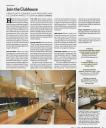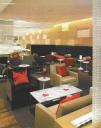Stolen from this guy’s website.
Author Archives: michael
Goose's Leap
Stolen from this guy’s website.
Lawrence Weinstein
I read about Dr. Weinstein in the Globe last night, and then I found a review on the web of his upcoming lecture to send to Adam. Adam wrote back, “A man after my own heart, in that I sense that he would likely ascribe to my conviction that intention and grace — in whatever form the latter occurs for any given individual — is valuable.” Unlike a normal person, who would have replied to Adam directly, I decided to post the forward and introduction of Weinstein’s book , “Grammar for the Soul: Using Language for Personal Change,” on the blog.
The paragraph that hooked my fleeting attention span?
“You know how they say that when your home is cluttered, so is your mind? Weinstein believes the same is true of grammar — if your commas are out of place, so is your soul.”
Introduction
The limits of my language mean the limits of my world.
• Ludwig Wittgenstein
Grammar? In most people’s minds, the closest synonym for “grammar†is “chore.†It’s about as inspiring a thought as “dust cloth.†It certainly seems to have no place in a discussion of ways to realize one’s potential as a whole person. All the same, I wish to suggest that our list of activities capable of hastening personal growth be expanded beyond yoga, meditation, and the martial arts to include the wise use of syntax and punctuation. During my first twenty years as a teacher of writing at the college level, I would not have dreamed of suggesting this idea. Like my colleagues, I viewed grammar’s importance strictly in terms of communication: only by following its rules can we Homo sapiens make our thoughts clear to one another. A randomly ordered, unmarked string of words such as “you rake hand me that would†is gibberish, whereas the correctly sequenced, punctuated sentence “Would you hand me that rake?†gets the job done. That was grammar’s great contribution to us—but its only contribution, insofar as I could tell.
2| Introduction
If, during those first twenty years in the classroom, I saw a connection between grammar and mental health, it was a negative one: a sizeable fraction of my students at both Harvard University and Bentley College had been verbally traumatized in the name of grammar. Their high school teachers had red-marked their papers so heavily for split infinitives, tense shifts, pronoun reference problems, run-ons, fragments, and the like that now they feared committing words to paper at all. They approached blank sheets of paper as they might a minefield. I actually once wrote an essay on those students’ behalf entitled “Grammar, What Big Teeth You Have.†I did not begin to think about how attention to grammar can enhance morale until I read some articles by linguist Benjamin Lee Whorf. According to him, any language—English or Hopi or Chinese—does more than enable its speakers to make their thinking clear to each other: it somewhat molds their thinking. By making it easier to express certain thoughts than others (and which thoughts those are, he says, differs from language to language), a language helps determine what one thinks and feels in the first place. In English, for example, we have tenses that separate the present from the past—that put the past behind us, in effect, implying it will never come again—and most of us who think in English therefore try not to “waste†time; we move in a hurry. By comparison, the Hopi Indians Whorf studied—whose management of tense implied that “everything that ever happened still isâ€â€”had less incentive to live fast and therefore led more measured lives.
3 | Introduction
A language, Whorf believed, can contribute either to neuroses (his term) or to more expansive, adaptive ways of thinking and being.
When I encountered Whorf, I knew little about differences between whole national grammars, but a fair amount about differences between the grammar of one English speaker and the grammar of another. Each of my students represented a distinct grammatical profile within English. One never used a question mark—or a hedging phrase or clause—but would use italics and adverbial intensifiers (“without doubt,†“very,†“extremely,†etc.) freely. Another stood out for inserting the occasional parenthesis or dash as a conversational touch. A third wrote sentences so long that they created the impression she couldn’t bear to part with them, and a fourth wrote only sentences of twenty-two words or less, each built along the simplest of lines from subject to predicate to object. In the course of reading Whorf, I began to wonder if his central insight applied to all these private languages as well as national ones. Could these linguistic differences be linked to different ways of thinking and living? If so, that seemed worth knowing, since making the right changes in one’s grammar might then be expected to improve one’s life, to some degree. Deciding to test my thesis on the speaker with whom I had the most influence, I resolved to start noticing the effects of my grammatical decisions on my own quality of life. As my experiment continued, this often meant behaving like a patient in a medical study and taking my soul’s vital signs. Respiratory rate? I learned that I don’t breathe as freely when I avoid use of the firstperson pronoun as when I use it. Pulse? A certain way of managing the future tense keeps the beat steady, regard-less of setbacks and unpleasant surprises. Temperature? Some grammatical moves—the use of ellipses, for example—warm up my relations with the people around me by implying tacit, shared knowledge, and I feel warmer.
Like my student who wrote endless sentences, I could go on and on in this vein: It makes a difference to my self-esteem whether I put a phrase bearing bad news about myself before the coordinate conjunction “but†or after it. It affects my level of hopefulness when I rely exclusively on forms of the verb “to be,†which reduce both things and people to static entities. I have now recorded scores of such connections between grammar and my own well-being, some pronounced, others subtle. Conceivably, at least, every attribute a person might desire to develop—from decisiveness in an emergency to trust and generosity and the ability to tolerate uncertainty—stands to benefit from changes in one’s verbal conduct, as I hope to show.
I have come to view the realm of grammar as a kind of rarefied gymnasium, where—instead of weights, a treadmill, mats, and a balance beam—one finds active verbs, passive verbs, periods, apostrophes, dashes, and a thousand other pieces of linguistic equipment, each of which, properly deployed, can provide exercise for the spirit like that which gym apparatus provides the body. Grammar can become a place to get in spiritual shape.
4 | Introduction
Several years into my self-study, I began to write short essays on my findings. The result is the book in your hands, an amalgam of reflections and very specific tips to try. For a while, I wrestled with embarrassment about publishing a book of practical suggestions for enhancing one’s quality of life by such novel means. Even with the help of well-established practices like meditation, no significant personal change occurs easily or quickly, and I didn’t wish to imply otherwise when it comes to grammar’s help. I think often of the lines in Philip Larkin’s poem “Aubade†about each person’s having just one stretch of years in which to live. “An only life,†he says,
. . . can take so long to climb
Clear of its wrong beginnings, and may never.
Still, I’ve told myself, many people clear that bar when they find the kinds of help that suit them personally; everyone deserves to know what has benefited others. For the right person, that mere feather-weight, a comma, can alter the course of a day.
Us
Hi, I’m Back From the Canyons
Hi Katie,
Yesterday I returned to civilization from our Escalante side-canyons trip. At our base camp, the wind blew like a banshee all day and every day. But on our hikes down into the canyons we were protected from the winds and it was warmer and more fun. We day-hiked in 2 canyons — Horse and Death Hollow — and backpacked through 2 others — Wolverine and Silver Falls. Wolverine had the most interesting rocks — petrified wood, agate, and blobby things that might have been coprolites. I’m sending a picture taken down in Wolverine Canyon where the walls narrowed down to a “slot”. Part of the slot was only about 6 feet wide and over a hundred feet deep. Death Hollow has better slots, but those were technically difficult to pass through, requiring roped climbing, mud wallowing, and swimming.
There weren’t as many flowers on this trip as last year’s, but that may have been because it rained the first day on that trip. This time, rain would have been welcome! In the 4 canyons we visited we found more flowering plants in Silver Falls canyon than in the others. One was a flowering Fishhook Cactus, with barbs that would never let go if you let them touch you. There were springs in Silver Falls Canyon, and a small creek that reflected the green leaves of the cottonwoods, the red sandstone cliffs, and the deep blue sky.
It was great out there in the desert, but flush toilets, running tap water, and refrigeration do have their attractions.
Love, Dad
Hi, I'm Back From the Canyons
Hi Katie,
Yesterday I returned to civilization from our Escalante side-canyons trip. At our base camp, the wind blew like a banshee all day and every day. But on our hikes down into the canyons we were protected from the winds and it was warmer and more fun. We day-hiked in 2 canyons — Horse and Death Hollow — and backpacked through 2 others — Wolverine and Silver Falls. Wolverine had the most interesting rocks — petrified wood, agate, and blobby things that might have been coprolites. I’m sending a picture taken down in Wolverine Canyon where the walls narrowed down to a “slot”. Part of the slot was only about 6 feet wide and over a hundred feet deep. Death Hollow has better slots, but those were technically difficult to pass through, requiring roped climbing, mud wallowing, and swimming.
There weren’t as many flowers on this trip as last year’s, but that may have been because it rained the first day on that trip. This time, rain would have been welcome! In the 4 canyons we visited we found more flowering plants in Silver Falls canyon than in the others. One was a flowering Fishhook Cactus, with barbs that would never let go if you let them touch you. There were springs in Silver Falls Canyon, and a small creek that reflected the green leaves of the cottonwoods, the red sandstone cliffs, and the deep blue sky.
It was great out there in the desert, but flush toilets, running tap water, and refrigeration do have their attractions.
Love, Dad
A Category of its Own
I’m busy dumping old computer files when I came across the email Jennifer sent me with this story. Powerful prose written in her legendary parenthetical style, but this time I’m moved by the similarity between Jennifer’s mother and what I’ve since read of Susan Sontag. Both were unflinching while healthy and both denied their end until the end.
That Phone
The last word on Matt’s, now Diane’s, iPhone.
After sitting in the snow and slush for two months the only noticeable problem was a quirky keypad. The numbers 4, 5, and 6, when tapped, would register the numbers above or below, unless you hit the center of the desired number and held your finger to the screen. After awhile even that didn’t work. This morning I made an appointment with a genius at the Apple Store in Pelham, N.H., and at 3:40 PM I was greeted by a young woman with straight black hair and a black t-shirt that read, “not all heros wear capes.†I looked at her and thought not all geniuses have hair like Phyllis Diller.
Kristen promptly pulled out an otoscope, one of those things you look into ears with, and peered down the hole I plug my ear bud jack into. She looked up and wagged her forefinger side to side and said, â€Has this phone been wet?†Before I could lie and say, “No, I removed it from it’s original box yesterday,†she said, “Because if it has that voids the warranty, and the little red strip inside this hole suggests it has. Would you like to look?â€
Good Publicity
Adam alerts me Sunday mornings to worthy reads in the Globe and the online edition of the New York Times. I look forward to his links. This Sunday he asked me if I’d read about Virgin Atlantic’s clubroom at Logan. I hadn’t but promised to have a look inside the Globe Magazine after dinner. As soon as I glanced at the photos I knew to scan the text for reference to his company, Collaborative Lighting. The magazine photos are much clearer and brighter than these scanned pics.
Superdel
“Pesky Godson of Chicago writes: “I cannot find the words splittist or splittism in my dictionary.”
Scent Sense
My nose has driven family and friends crazy over the years. It’s a curse. I can smell a bear a half mile away, garlic on the breath of someone clear across the room, the clashing multiple perfume scents in a theatre. I’ve been known to wake John up in the middle of the night with “what’s that smell†simply because a cigarette smoker has walked on the sidewalk out front.  Never mind how I’ve been tortured by teens after skiing-hiking-baseball-soccer-snowboarding refusing to drive them anywhere until they showered…..
But yesterday my nose failed me. Happily curled up with a book, visiting with my parents, I wondered why I had such a headache? Mike and Di walk in and Mike immediately says “I smell gasâ€. “No way†I say, and ignore him.   Mike promptly went to the gas stove and turned it on.
The house did not explode. But indeed we had a leaky furnace. Now we owe him our lives.
BirdBrain
Sunrise
Once I realized that the sunrise was not at that conjunction but over land, I raced down the beach, but I was too late to see the sun lift off the water. Oh well, there’ll always be another time. The real question is what do I do now that I’m up?
I could take pictures of prints of paintings on the wall of our motel.









